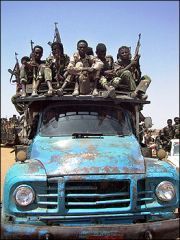Eastern Sudan rebels prepare for war with show of force
NEAR TELKOK, Sudan, April 2 (AFP) — A bewitching Arabic tune wafts through tents scattered around the desert plain here in rebel-held eastern Sudan when the mood shifts suddenly with the arrival of the fighters.

|
|
Supporters of rebels from Sudan’s Eastern Front parade during a conference held by the Front north of Kassala town, near the Eritrean border on Friday April 1, 2005. The rebels denounced marginalization of their region by Khartoum and say they are ready to resume fighting.(AFP) . |
Three battered lorries and dozens of dirty pick-up trucks career across the sand and dirt, their screeching brakes failing to drown out the noisy cheers of the hundreds of poorly clad but well-armed rebel soldiers they carry.
Waving AK-47 assault rifles, the fighters, many with fuzzy Afros and many appearing quite young, vow to fight for their cause: ending what they say is the marginalization of eastern Sudan at the hands of Khartoum.
“These are only a small sample of our army,” smiles Salah Barqueen, a leader of the Beja Congress, one of two groups that recently formed the Eastern Front to fight for people’s rights in Sudan’s eastern Red Sea and Kassala states.
Like their counterparts in more the well-publicized conflict in Sudan’s troubled western Darfur region, the ethnic minority Eastern Front complain they are being ignored by the Arab-dominated regime in Khartoum.
“Our region lacks hospitals, schools, water, transport systems, everything,” says the front’s newly-elected president, Musa Mohamed Ahmed.
“If the government is ready to solve the problem peacefully, we are also ready,” he told AFP here at a rebel base north of Kassala near the Eritrean border where the Eastern Front gathered this week to plot strategy.
“If they are not, we are also ready,” said Ahmed, who clad in a dark-green combat uniform seems to be readying himself to command troops.
The Beja Congress and their colleagues in the Eastern Front, the Free Lions, are both descendents of Arab immigrants to Sudan: the Beja centuries ago and Rashaidas in the 19th century.
Angered by what they say is a radically unequal distribution of Sudan’s wealth from natural resources like oil, the Eastern Front rebels took up arms against Khartoum like those in Darfur and southern Sudan before them.
But with international attention focused squarely on Darfur and this year’s landmark peace deal between Khartoum and the southern Sudan People’s Liberation Army, the Eastern Front has languished in relative obscurity.
In late January, though, their cause made headlines when at least 14 and as many as 36 Beja Congress supporters were killed by Sudanese security forces breaking up a demonstration in the eastern city of Port Sudan.
In the aftermath of the violence, Khartoum pledged to hold talks with the rebels but that offer has been met with widespread skepticism here where the front’s leaders were considering their next steps.
“I don’t think the government is genuine when it mentions peace talks,” Ahmed says, echoing earlier rebel demands those responsible for the Port Sudan violence must be tried by an international court if discussions are to be held.
Without justice, the front leadership says there will be no talks and no peace for Khartoum and maintains that its firepower will be enough to defend itself from the government army and proxy militia.
And top officials and fighters are steeling themselves for conflict wider that the sporadic clashes that have been the norm in recent years.
“Without force we won’t be able to recover our rights,” says new rebel army recruit Suleiman Saleh.
Saleh, who appears older than his stated age of 15, was one of dozens of new recruits the Eastern Front congress was partly called to drum up.
Children younger than 10 who volunteered were rejected for their age but their enthusiasm was energetically cheered by a crowd of 2,000 to 3,000 people who gathered in the cool desert twilight to witness an initiation ceremony.
Every so often, a lone voice would call out a victory cry which the assembled crowd would roar back several times.
After dusk fell and numerous officials delivered their speeches, a concert was held and in front of a large stage, old men with swords and young AK-47 toting rebels danced late into the night, singing that victory was at hand.
